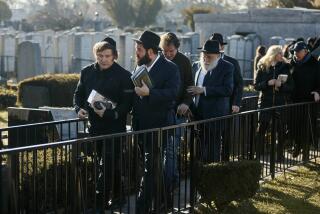Country Now Accept Religious, Ethnic Plurality : After 500 Years, Jews, Arabs Are Returning to Spain
MADRID — For centuries after Arabs and Jews were banished from Spain, the splendid Moorish palaces of the Arabs and the white-washed medieval Jewish quarters were the only visible signs of their presence.
But 500 years after they were forced to leave, Arabs and Jews have again established a presence in Spain.
Although it is just beginning to be felt, Jews actually began trickling back to Spain during World War II. Arabs began arriving in large numbers in the late 1970s.
The return has awakened interest in the role the two groups played in Spanish history and has had an economic, political and diplomatic impact on modern Spain.
Heavy Arab investment and tourism, especially in the south, has boosted Spain’s troubled economy, although a smattering of terrorist attacks in the Arab community has raised fears of violence.
Ties to Israel Sought
Spain’s 12,000 Jews, trying to eliminate traces of the official anti-Semitism that existed under the dictatorship of Francisco Franco, are lobbying for formal Spanish relations with Israel.
The socialist government of Spain, the only Western European country never to have had diplomatic ties with the Jewish state, has promised recognition.
The visibility of the Jewish community, considered exotic in Roman Catholic Spain, is increasing. A recent traditional Jewish wedding in Madrid was the subject of a national television documentary that included the caterer’s solemn explanation of the process of kosher cooking.
At about the same time, archeologists working in 11th-Century Arab ruins in southern Spain heard from Muhamad del Pozo, the Muslim emir of Granada, who demanded that they stop digging up skeletons. The archeologists were shocked that there was an emir in Granada.
“As late as the 1960s the school books were full of the idea that Spain existed only because it had strict religious unity, that Jews and Muslims had been allied against Catholic Spain,” said Samuel Toledano, head of the federation of Spanish Jewish communities.
Plurality Accepted
“Now we find that, by and large, Spanish society is prepared to accept plurality in religion. This is a tremendous change when you consider that for the past five centuries it was a totally intolerant country.”
Arabs and Jews were expelled from Spain by Ferdinand and Isabella after the Arabs surrendered to the Christian armies at Granada in 1492, the same year the monarchs sent Columbus on a trip that was to result in the discovery of the New World.
The banishment ended 700 years of Arab rule over Iberia. At its height in the 11th-Century, the kingdom of al-Andalus was one of the most learned, advanced and powerful in Europe, with Jewish scholars and scientists playing an important role.
In 1492, Spain’s estimated 600,000 Jews were ordered to accept baptism or leave. Most left, many to North Africa and the Balkans. Called Sephards, the Hebrew word for Spaniards, their descendants are today’s Sephardic Jews.
Some Spanish groups, like the Chuetas of Majorca, are believed to be direct descendants of converted Jews.
Forced Baptism
Soon after, Muslims still in Spain endured forced baptism and persecution during the Inquisition--which also targeted Jews--until its end in 1834. The edicts of expulsion were not retracted until 1966.
Although figures are hard to come by, officials believe there are now at least 100,000 Arabs in Spain, mostly temporary residents, businessmen, students and immigrant workers, and mostly in the south, attracted apparently by the warm climate and Arab influence left from earlier times.
“The Arab impact in Spain was very important, and what a Spaniard is today has a lot to do with this influence,” said Jesus Carlos Riosalido, director of Madrid’s Spanish-Arab Institute of Culture.
The boom in Arab investment was highlighted last year when the Arab Banking Corp. bought one of Spain’s largest banks. At least $600 million in Arab funds have been sunk into real estate and other projects in the Costa del Sol.
New mosques have been built for the first time since the 15th Century--one outside the exclusive resort of Marbella and another near the old Arab capital, Cordoba.
$2-Million Saudi Donation
Saudi Arabia’s King Fahd has built a $60-million replica of the White House in Marbella and donated $2 million for low income housing there.
Riosalido said some of the traditional fear and hatred of Arabs remain. Hundreds of villages still have annual “Christians and Moors” festivals where half the townspeople put on blackface, dress up and lose a mock battle to the Christians.
More to Read
Sign up for Essential California
The most important California stories and recommendations in your inbox every morning.
You may occasionally receive promotional content from the Los Angeles Times.










